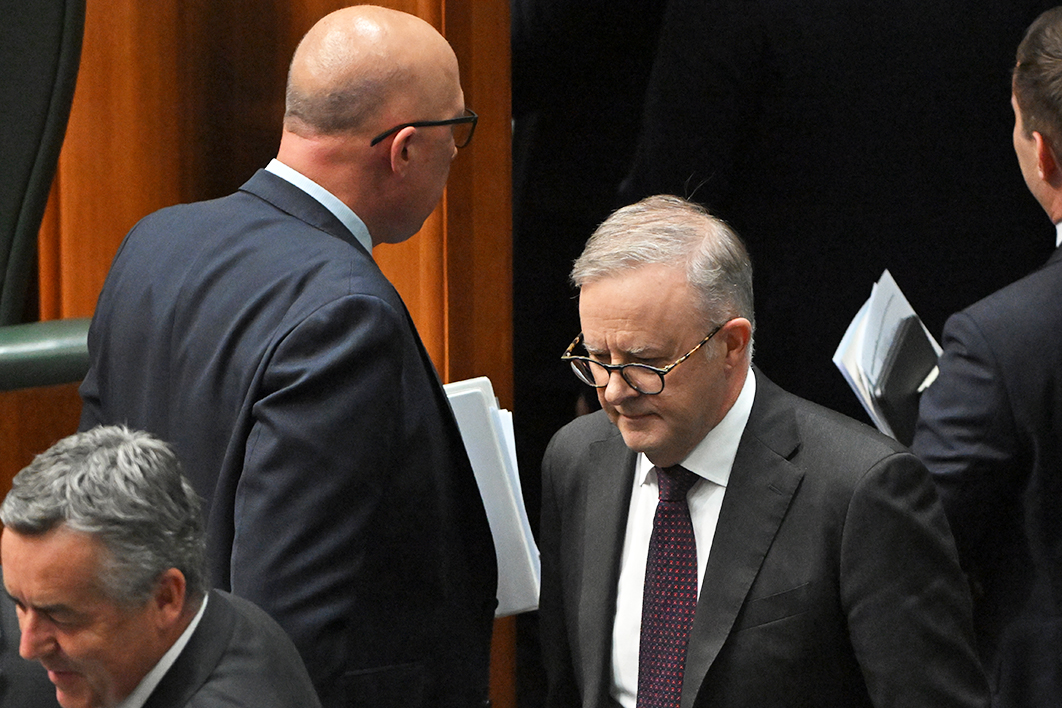
Peter Dutton is on a roll. Over the past six months, across the published opinion polls, the Albanese government’s two-party-preferred lead has been steadily whittled down and is now, for the most-watched pollster, Newspoll, zero. That is, 50–50 two-party-preferred, from primary votes of 31 for Labor and 38 for the Coalition.
Might it continue dropping? (The rather jumpy Roy Morgan had Labor support dipping to 49.5 earlier in November before bouncing back to 52.5 per cent. Let’s see what December brings.)
Coming after the Voice result, the trajectory has led at least a couple of excited commentators to anticipate a one-term Albanese government. The Australian’s Peta Credlin has penned a rallying of the troops and a hoorah for Liberal leader Peter Dutton. In the Nine papers, Shaun Carney’s rather tendentious offering, aimed squarely at prime minister Anthony Albanese, even implies the PM might not last until the next election.
A fortunate by-product of the narrowing is that we no longer need to endure stories of the Coalition’s existential crisis because of low support among young voters.
But how much do surveys this far before an election tell us about the upcoming result? The answer: nothing at all. This was true when the Labor government was way ahead, and it’s true today. It’s only big, sustained leads for oppositions that should give us pause, and even then we’ve seen the last-minute government comebacks getting bigger over recent decades.
Can we treat this as routine midterm doldrums? Dutton “cutting through”? Damage inflicted by the Voice referendum and the perception that it was an expensive indulgence? Kudos for the opposition leader for backing the right horse?
Or is it the economy — with hip pockets screaming about high inflation, particularly among that not-insignificant minority of voters with variable mortgages?
Or was this always going to happen once the honeymoon ended?
Everyone with a keyboard can explain what the government’s been doing wrong, but that’s all post hoc rationalisation of the polls, much as we saw in the Voice campaign. The next election will be decided by voters’ perceptions of the alternatives on offer, not illusory poll-generated “momentum.”
Still, as the year comes to a close, Mr Albanese must be a rather gloomy prime minister. For election watchers and the political bubble, opinion polls tell us how parties are “travelling” — and who doesn’t want to be seen to be “travelling well”? It makes for an easier life in the media and keeps MPs, most importantly marginal seat holders, and the wider party content. Most would agree that the current polls don’t predict the next election result, but they do measure something approximating the electorate’s happiness with the government.
It’s all indisputably good news for Dutton. The polls, and the interpreting of them, buttress his leadership. And if more friendly ones arrive in December he’ll be able to relax over summer.
But is what’s good for Dutton’s position good for the Coalition — specifically, its chances of forming government after the next election?
The Liberal leader has explicitly repositioned his party away from big business, with its “woke” attitudes and “virtue signalling” — and implicitly away from voters in wealthy, urban, formerly blue-ribbon electorates too — towards the “outer suburbs and regions.” Such politicking, politely referred to as “values”-driven, involves encouraging a fear of the outside world and, at home, resentment towards ethnic minorities. This is Dutton’s political comfort zone and indeed his brand. It’s what drove his rise to the top of his party.
In olden days the Liberals had to tread carefully on this path lest they alienate voters in wealthy blue-ribbon electorates. Now they’ve lost most of those seats, the constraint has loosened. It’s easier to forgo potential gains than consciously sacrifice current sitting MPs.
The six teal 2022 wins were all at the expense of Liberal “moderates.” Each of those Liberals supported Malcolm Turnbull against Dutton in the 2018 leadership spill, for instance. Who in the current party room is vulnerable to teal-like incursions? Paul Fletcher (Bradfield) and Julian Leeser (Berowra) on Sydney’s north shore come to mind. They also supported Turnbull, so perhaps would be no great loss from Dutton’s point of view.
The strategy might work, but it would probably require a very big national vote for the Coalition. Anything around 51–49 either way would likely produce a hung parliament, and while the teals won’t necessarily vote as a bloc, it’s difficult to imagine the six, and independents Zali Steggall (Warringah) and Helen Haines (Indi), supporting a Dutton-led Coalition.
Put simply, Peter Dutton is not a Liberal leader the teals would be likely to elevate to the prime ministership.
And then there are voters in teal seats. We don’t know what the crossbench will look like in 2025. If Steggall’s 2022 re-election is any guide then the six will romp home. But that was against a poor Liberal candidate, and Scott Morrison as prime minister.
Detestation of Morrison was a core driver of the teals’ success. And many of the characteristics those voters couldn’t abide in Morrison are shared by the current Liberal leader.
We do live in unpredictable times, with low primary vote support on both sides leaving more to the vagaries of preferences and how-to-vote cards. With those teal seats in the way, the Coalition will very likely need a lot more than 50 per cent of the national two-party-preferred vote to form government at the next election. More like 52 or 53 per cent.
Or another leader. One the crossbenchers felt they could work with. •
The post Peter Dutton’s momentum appeared first on Inside Story.







